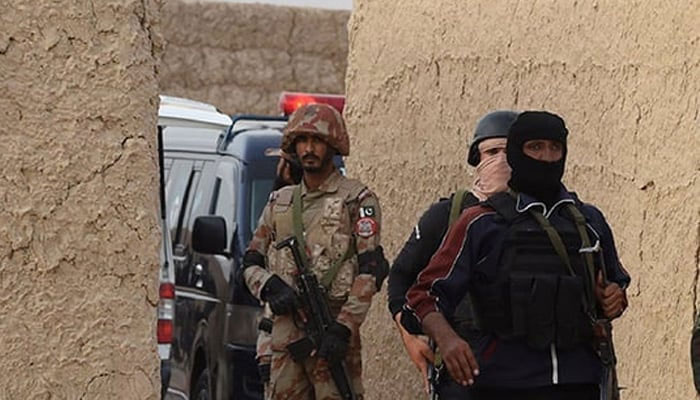Mastung attack
The fallout from this attack highlights a broader crisis that has persisted for far too long
Pakistan’s security situation has reached a perilous juncture, and Friday’s attack in Mastung, Balochistan, is a grim reminder of this reality. At least nine people including five schoolchildren and a police personnel were killed in a blast reportedly targeting a police mobile near the Girls High School at the Civil Hospital Chowk in Mastung on Friday. The fallout from this attack highlights a broader crisis that has persisted for far too long. Since till the time this editorial written no militant group had claimed responsibility, speculation about the attack’s motives – including possible ties to the ongoing polio vaccination campaign – were still strong, deepening the sense of unease. Pakistan is one of the last two countries battling endemic polio, and the alarming surge in cases – 43 reported this year, 22 of which are from Balochistan alone – exposes the failure of successive governments to protect citizens and effectively address public health issues.
Grassroots movements have persistently tried to draw attention to the growing unrest in our peripheries, yet their calls have met with silence from those in power. Political leaders have consistently shunned meaningful engagement with their constituents, leaving a vacuum that malicious elements readily exploit. This inability to value human life, to engage with communities, and to confront the root causes of discontent creates fertile ground for insurgency and violence. The lives impacted by these attacks are often reduced to mere statistics, but each blast reverberates through families and communities. Children who should be learning and playing are instead left to navigate a landscape marred by violence. This cycle of violence breeds desperation, pushing individuals towards extremist paths when their basic needs go unmet.
Societal divisions in Pakistan are deepening, with stark contrasts between the privileged few and the marginalised many. While the government focuses on attracting foreign investment – an essential component for economic growth – it must recognise that stability is a prerequisite for this endeavour. The state’s current trajectory is untenable; its inaction renders it complicit in the chaos we are witnessing. Promises to combat violence ring hollow against a backdrop of leniency towards those who perpetuate it. The time for change is now. The state must prioritise security and stability, ensuring that our streets are safe for every citizen, regardless of their socio-economic status. Only through concerted action can we foster an environment conducive to peace and economic prosperity. The lives lost in Mastung – and in countless other such incidents – demand not just our grief, but a decisive response that puts an end to this cycle of violence and neglect.
-
 Benny Blanco Addresses ‘dirty Feet’ Backlash After Podcast Moment Sparks Online Frenzy
Benny Blanco Addresses ‘dirty Feet’ Backlash After Podcast Moment Sparks Online Frenzy -
 Sarah Ferguson Unusual Trait That Confused Royal Expert
Sarah Ferguson Unusual Trait That Confused Royal Expert -
 Prince William, Kate Middleton Left Sarah Ferguson Feeling 'worthless'
Prince William, Kate Middleton Left Sarah Ferguson Feeling 'worthless' -
 Ben Affleck Focused On 'real Prize,' Stability After Jennifer Garner Speaks About Co Parenting Mechanics
Ben Affleck Focused On 'real Prize,' Stability After Jennifer Garner Speaks About Co Parenting Mechanics -
 Luke Grimes Reveals Hilarious Reason His Baby Can't Stop Laughing At Him
Luke Grimes Reveals Hilarious Reason His Baby Can't Stop Laughing At Him -
 Why Kate Middleton, Prince William Opt For ‘show Stopping Style’
Why Kate Middleton, Prince William Opt For ‘show Stopping Style’ -
 Here's Why Leonardo DiCaprio Will Not Attend This Year's 'Actors Award' Despite Major Nomination
Here's Why Leonardo DiCaprio Will Not Attend This Year's 'Actors Award' Despite Major Nomination -
 Ethan Hawke Reflects On Hollywood Success As Fifth Oscar Nomination Arrives
Ethan Hawke Reflects On Hollywood Success As Fifth Oscar Nomination Arrives -
 Tom Cruise Feeling Down In The Dumps Post A Series Of Failed Romances: Report
Tom Cruise Feeling Down In The Dumps Post A Series Of Failed Romances: Report -
 'The Pitt' Producer Reveals Why He Was Nervous For The New Ep Of Season Two
'The Pitt' Producer Reveals Why He Was Nervous For The New Ep Of Season Two -
 Maggie Gyllenhaal Gets Honest About Being Jealous Of Jake Gyllenhaal
Maggie Gyllenhaal Gets Honest About Being Jealous Of Jake Gyllenhaal -
 'Bridgerton' Star Luke Thompson Gets Honest About Season Five
'Bridgerton' Star Luke Thompson Gets Honest About Season Five -
 Prince William On Verge Of Breakdown Because Of 'disgraced' Andrew
Prince William On Verge Of Breakdown Because Of 'disgraced' Andrew -
 Tig Notaro Reflects On Oscar Nod For 'Come See Me In The Good Light': 'I Was Sleeping'
Tig Notaro Reflects On Oscar Nod For 'Come See Me In The Good Light': 'I Was Sleeping' -
 Kenyon Sadiq Sets 40-yard Dash Record At NFL Scouting Combine, Eyes First Round
Kenyon Sadiq Sets 40-yard Dash Record At NFL Scouting Combine, Eyes First Round -
 Talk Show Host Drops Hint About Taylor Swift, Travis Kelce Wedding Date
Talk Show Host Drops Hint About Taylor Swift, Travis Kelce Wedding Date




